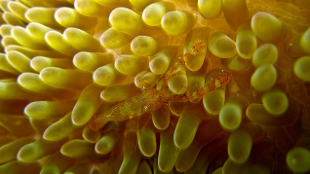Dr. George Chandy at the University of California, Irvine discovered a toxin in Caribbean sun anemones (see photo) in 1984 and has spent his career studying the toxin. Prior work by his team suggested that a synthetic version of a peptide (ShK-186) from the toxin may help treat autoimmune disease. It works by blocking a specific potassium channel (Kv1.3) important in immune system reactivity. Since potassium channels are also important in the regulation of metabolism and body weight, his team wanted to explore whether this peptide could be used to treat obesity. Mice on a diet high in fat and sugar were administered ShK-186, which decreased weight gain, fat deposits, cholesterol, blood sugar, and fatty liver. The hypothesis is that ShK-186 reduces inflammation and activates brown fat, known for its calorie-burning properties.
Source:
May 29 University of California, Irvine Press Release


Very interesting the article. I think what caribbean sun anemon was been to be explored on distance
How interesting! I am pursuing a degree in nutrition, so this post really caught my attention. Because of the huge increase in obesity in our population, serious health problems such as diabetes, heart disease, high cholesterol, and high blood pressure are becoming very prevalent. For many of these people, a drug like this could be a lifesaver. I was reading further into this research and was surprised by some of the information not mentioned. This study has been performed on rats that have been subjected to a high fat, high sugar diet. When presented with the drug, their weight dropped, along with their fat deposits, cholesterol, fatty liver, and blood sugar. However, what this post failed to mention, was that when the drug was administered to rats that were fed on a standard diet, no changes were observed. The effects could be different on humans, but from what I know, simply changing to a healthier diet and including physical exercise can have a similar effect, without any side effects that usually come about from medicines. Another point that caught my interest was the fact that this compound activates brown fat, which, unlike white fat that stores fat cells, releases the stored energy as heat, therefore burning calories. In animals, the brown fat percentage is significantly higher in animals, including rats. In humans, brown fat only constitutes 1% of all the fat cells in the body, meaning that an increase in brown fat activity would not amount to much of anything. Despite all of this, the Caribbean Sun Anemone toxin could indeed hold the secret solution for obesity. While diet and exercise is the safest way to reduce the risk of obesity and its effects, some people may still need the extra help. I would very much like to see more on this research and hope for a more clear resolution.
As someone who is not obese, but significantly overweight, I find this post very interesting. Finding a way to speed up metabolism from a natural source like this would be preferable to the many pills promising quick results. I have always been wary of such medicines. Since this anemone helps reduce other serious health issues, such as cholesterol and blood sugar, its potential is extremely useful. It is hard to tell how long it may take before this could actually be used in an everyday setting. It's taken almost thirty years for the research to be carried this far. I'm glad someone is trying to make great use of these anemones though.
This is a very interesting article, as I am very interested in skin properties and working out. After doing some research these anenome's are found in shallow water in the caribbean with slow to mild currents and is known as the sun anenome. I find it amazing that tasting on rats would reveal overall wellness for the animal itself. Other sites reveal that the toxins were taken from a potassium channel. Overall, the advancement in this topic would intrigue anyone, something natural helping out us on Earth. http://www.ncbi.nlm.nih.gov/pubmed/7660365
Wow your article is very informative, i would really like to see more.